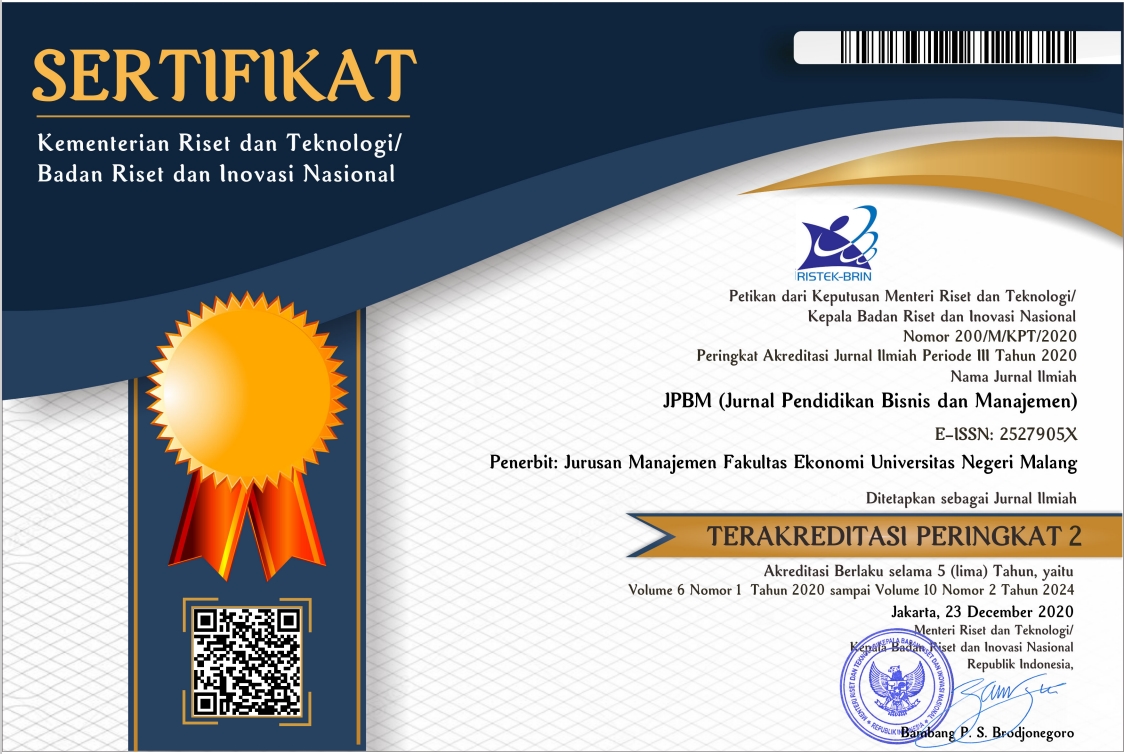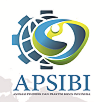The Effect of Productive Subject Competencies Against Industrial Work Practices
Abstract
the purpose of this study was to determine the suitability of students' productive learning competencies with the implementation of industrial work practices in SMK Muhammadiyah 5 Kepanjen, Malang.. This research used a descriptive qualitative approach. Data collection was obtained by conducting interview techniques, observation, and study documentation. The subjects of this study were the head of the industrial work practice program, the head of office management automation competency expertise, students of XI grade at SMK Muhammadiyah 5 Kepanjen, and the DUDI. The results of this study were (1) the process of implementing industrial work practices began with planning by schools, testing the productive ability of students, debriefing, placement, checking, and pickup, (2) evaluation of industrial work practices in SMK Muhammadiyah 5 Kepanjen was done by asking the opinions of all those who participated in industrial work practices, but it did not include DUDI in the valuation activities, (3) the competency of office automation and governance in SMK Muhammadiyah 5 Kepanjen was already relevant to DUDI demands but there were several DUDI still unable to provide relevant jobs with competencies held by students in office automation and governance.
Keywords
Full Text:
PDFReferences
Albrechtsen, E., Solberg, I., Svensli, E., 2019. The application and benefits of job safety analysis. Saf. Sci. 113, 425–437.
https://doi.org/10.1016/j.ssci.2018.12.007
Andayani, E. 2016. Analisis Praktik Kerja Industri Terhadap Penguasaan Skill Siswa dalam Mengahadapi Dunia Kerja di SMK NU Bululawang Malang. Jurnal Inspirasi Pendidikan, 6(1), 744-754. Dari http://ejournal.uni kama.ac.id/index.phpn/jrnspirasi/ article/download/1079/839.
Bakar, R., 2018. The influence of professional teachers on Padang vocational school students’ achievement. Kasetsart J. Soc. Sci. 39, 67–72.
https://doi.org/10.1016/j.kjss.2017.12.017
Bartono, P.H. 2005. Hotel Training Yang Efektif. Yogyakarta: ANDI OFFSET.
Berge, W. van den, 2018. Bad start, bad match? The early career effects of graduating in a recession for vocational and academic graduates. Labour Econ., European Association of Labour Economists 29th annual conference, St.Gallen, Switzerland, 21-23 September 2017 53, 75–96.
https://doi.org/10.1016/j.labeco.2018.05.011
Direktorat Pembinaan Sekolah Menengah Kejuruan. 2018. Pedoman Praktik Kerja Lapangan (PKL) Peserta Didik SMK. Jakarta: Depdikbud.
Gur, N., 2012. Government ownership of banks, job creation opportunities and employment growth. Econ. Lett. 117, 509–512.
https://doi.org/10.1016/j.econlet.2012.06.039
Heijke, H., Meng, C., Ris, C., 2003. Fitting to the job: the role of generic and vocational competencies in adjustment and performance. Labour Econ., European Association of Labour Economists, 14th Annual Conference, 2002
, 215–229. https://doi.org/10.1016/S0927-5371(03)00013-7
Mills, M.J., Fullagar, C.J., 2017. Engagement within occupational trainees: Individual difference predictors and commitment outcome. J. Vocat. Behav. 98, 35–45.
https://doi.org/10.1016/j.jvb.2016.09.004
Munastiwi, E., 2015. The Management Model of Vocational Education Quality Assurance Using ‘Holistic Skills Education (Holsked).’ Procedia - Soc. Behav.
Sci., The 4th World Congress on Technical Vocational Education and Training (4thWoCTVET), 5-6 December 2014, Universiti Tun Hussein Onn Malaysia, MALAYSIA 204, 218–230.
https://doi.org/10.1016/j.sbspro.2015.08.144
Sella, L., 2014. Enhancing Vocational Training Effectiveness Through Active Labour Market Policies. Procedia - Soc. Behav. Sci., 4th World Conference on
Learning Teaching and Educational Leadership (WCLTA-2013) 141, 1140–
https://doi.org/10.1016/j.sbspro.2014.05.192
Sermsuk, S., Chianchana, C., Stirayakorn, P., 2014. A Study of Model of Vocational Curriculum Development Under Vocational Education Commission Using Cross-impact Analysis. Procedia - Soc. Behav. Sci. 116, 1896–1901. https://doi.org/10.1016/j.sbspro.2014.01.491
Sin, S.-C.J., Kim, K.-S., 2018. How Are We the Same or Different: Information Needs and Barriers of Domestic and International Students. J. Acad. Librariansh.
, 712–723. https://doi.org/10.1016/j.acalib.2018.10.005
Subekhi, A. & Jauhar, M. 2012. Pengantar Manajemen Sumber Daya Manusia (MSDM). Jakarta: Prestasi Pustaka
Sudaryono. 2012. Dasar-Dasar Evaluasi Pembelajaran. Yogyakarta: Graha Ilmu.
Sudjana, N. 2014. Penilaian Hasil Proses Belajar Mengejar. Bandung: PT Remaja Rosdakarya.
Tamm, M., 2018. Training and changes in job Tasks. Econ. Educ. Rev. 67, 137–147.
https://doi.org/10.1016/j.econedurev.2018.09.007 Undang-Undang Dasar Republik Indonesia Tahun 1945. Pom (online), (jdih.pom.go.id/uud1945.pdf), diakses 21 November 2018.
Undang-Undang RI No. 20 Tahun 2003 tentang Sistem Pendidikan Nasional.
Jaringan Dokumentasi dan Informasi Hukum Badan Pemeriksa Keuangan Republik Indonesia. Bpk (online), (www.jdih.bpk.go.id), diakses 23 November 2018.
Universitas Negeri Malang. 2017. Pedoman Penulisan Karya Ilmiah: Skripsi, Tesis, Disertasi, Artikel, Makalah, Tugas Akhir, Laporan Penelitian. Edisi Keenam. Malang: Universitas Negeri Malang.
Valdez. 2015. Contributions of On-the-Job Training Program to the Skills, Personal Qualities, and Competencies of Tourism Graduates. Asia Pacific Journal of Multidisciplinary Research, 3(4), 102-110. Dari https://www. researchgate.net/publication/288807944.
Wena, M. 1997. Pendidikan Kejuruan Sistem Ganda. Malang: Institut Keguruan Ilmu Pendidikan Malang.
DOI: http://dx.doi.org/10.17977/um003v5i32019p103
Refbacks
- There are currently no refbacks.
JPBM (Jurnal Pendidikan dan Bisnis Manajemen) is licensed under a Creative Commons Attribution-NonCommercial-ShareAlike 4.0 International License.
JPBM (Jurnal Pendidikan dan Bisnis Manajemen) is abstracted and indexed in :
















